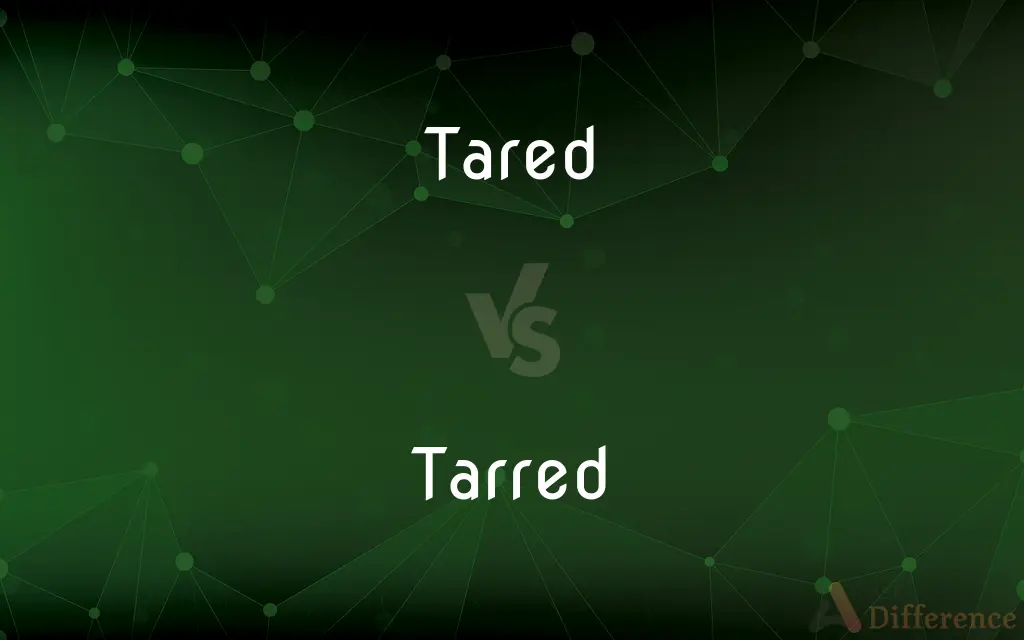Tared vs. Tarred — What's the Difference?
By Fiza Rafique & Urooj Arif — Updated on April 22, 2024
Tared refers to adjusting a scale's weight to zero with a container, while tarred means covered or coated with tar.

Difference Between Tared and Tarred
Table of Contents
ADVERTISEMENT
Key Differences
Tared is a term frequently used in weighing processes, where the scale is adjusted to zero to account for the weight of a container or packaging. This ensures that the weight measured is that of the contents alone. On the other hand, tarred describes the process of applying tar to a surface, commonly used for waterproofing or paving.
In laboratory or commercial settings, tared weights are critical for precise measurements, where even minor inaccuracies can affect outcomes. Whereas tarred surfaces are important in construction and roadwork, providing durability and protection against environmental factors.
The concept of taring is essential in the culinary and pharmaceutical industries, ensuring ingredients or compounds are measured accurately without the weight of their containers. On the other hand, tarred roads are a foundational aspect of modern infrastructure, enhancing safety and longevity.
Taring a scale can be quickly done with modern digital scales, which have a button specifically for this function. In contrast, tarred surfaces require manual labor and materials, such as tar or asphalt, which are spread and then compacted.
Taring is a subtractive process, aiming to negate excess weight, enhancing the accuracy of the final weight. Conversely, tarred is an additive process, where materials are added to surfa
ADVERTISEMENT
Comparison Chart
Definition
Adjusting a scale to zero accounting for container weight
Coating or treating with tar
Usage
In weighing processes
In construction and road maintenance
Purpose
To measure the net weight accurately
To protect and stabilize surfaces
Process Type
Subtractive (removing the weight of the container)
Additive (adding layers of tar)
Industry
Laboratory, culinary, pharmaceutical
Construction, infrastructure
Compare with Definitions
Tared
The scale is zeroed to get the net weight.
The laboratory assistant tared the balance before adding the chemical.
Tarred
To coat something with tar.
The workers tarred the road to prepare for winter.
Tared
Setting the scale to ignore the weight of containers.
She tared the kitchen scale to weigh the flour directly in the bowl.
Tarred
The action of treating surfaces for protection.
The wooden boat was tarred to make it waterproof.
Tared
Calibration of weighing devices to zero.
He tared the shipping scale to ensure the package's weight was accurate.
Tarred
To cover with a protective layer of tar.
He tarred the driveway to enhance its durability.
Tared
The process of adjusting scales for container weights.
After taring the scale, the net weight displayed was purely the sample's.
Tarred
Applying a thick, dark, viscous material.
The old warehouse roof was tarred to prevent leaks.
Tared
To negate container weight in measurements.
Tared weight is essential for precise formulation in pharmacies.
Tarred
Used in maintaining roads and pavements.
The city crew tarred the potholes last summer.
Tared
The weight of a container or wrapper that is deducted from the gross weight to obtain net weight.
Tarred
A dark, oily, viscous material, consisting mainly of hydrocarbons, produced by the destructive distillation of organic substances such as wood, coal, or peat.
Tared
A deduction from gross weight made to allow for the weight of a container.
Tarred
See coal tar.
Tared
(Chemistry) A counterbalance, especially an empty vessel used to counterbalance the weight of a similar container.
Tarred
A solid residue of tobacco smoke containing byproducts of combustion.
Tared
To determine or indicate the tare of, especially to weigh in order to find out the tare.
Tarred
To coat with or as if with tar.
Tared
Weighed; determined; reduced to equal or standard weight.
Tarred
Simple past tense and past participle of tar
Tared
Simple past tense and past participle of tare
Tared
Weighed; determined; reduced to equal or standard weight; as, tared filter papers, used in weighing precipitates.
Common Curiosities
What does tarred mean?
Tarred means coated or covered with tar.
Why are streets and roofs tarred?
Streets and roofs are tarred to protect them from water damage and to enhance their longevity.
How is taring useful in a laboratory?
Taring is useful for ensuring that measurements only include the weight of the material, not its container.
What materials are used in tarred surfaces?
Materials such as tar and asphalt are used for tarred surfaces.
Is taring necessary in everyday cooking?
Taring is often necessary when precise ingredient measurements are needed.
Can taring affect the accuracy of measurements?
Yes, proper taring is crucial for accurate measurement results.
What does tared mean?
Tared means setting a scale to zero to exclude the weight of the container.
What types of scales can be tared?
Most modern digital scales used in kitchens, labs, and industries cane be tared.
How often should roads be tarred?
The frequency depends on the road usage and environmental conditions, but maintenance is typically periodic.
What is the difference between tared weight and gross weight?
Tared weight is the net content weight, whereas gross weight includes the container.
Share Your Discovery

Previous Comparison
Tubist vs. Tubaist
Next Comparison
Forest vs. WoodsAuthor Spotlight
Written by
Fiza RafiqueFiza Rafique is a skilled content writer at AskDifference.com, where she meticulously refines and enhances written pieces. Drawing from her vast editorial expertise, Fiza ensures clarity, accuracy, and precision in every article. Passionate about language, she continually seeks to elevate the quality of content for readers worldwide.
Co-written by
Urooj ArifUrooj is a skilled content writer at Ask Difference, known for her exceptional ability to simplify complex topics into engaging and informative content. With a passion for research and a flair for clear, concise writing, she consistently delivers articles that resonate with our diverse audience.














































